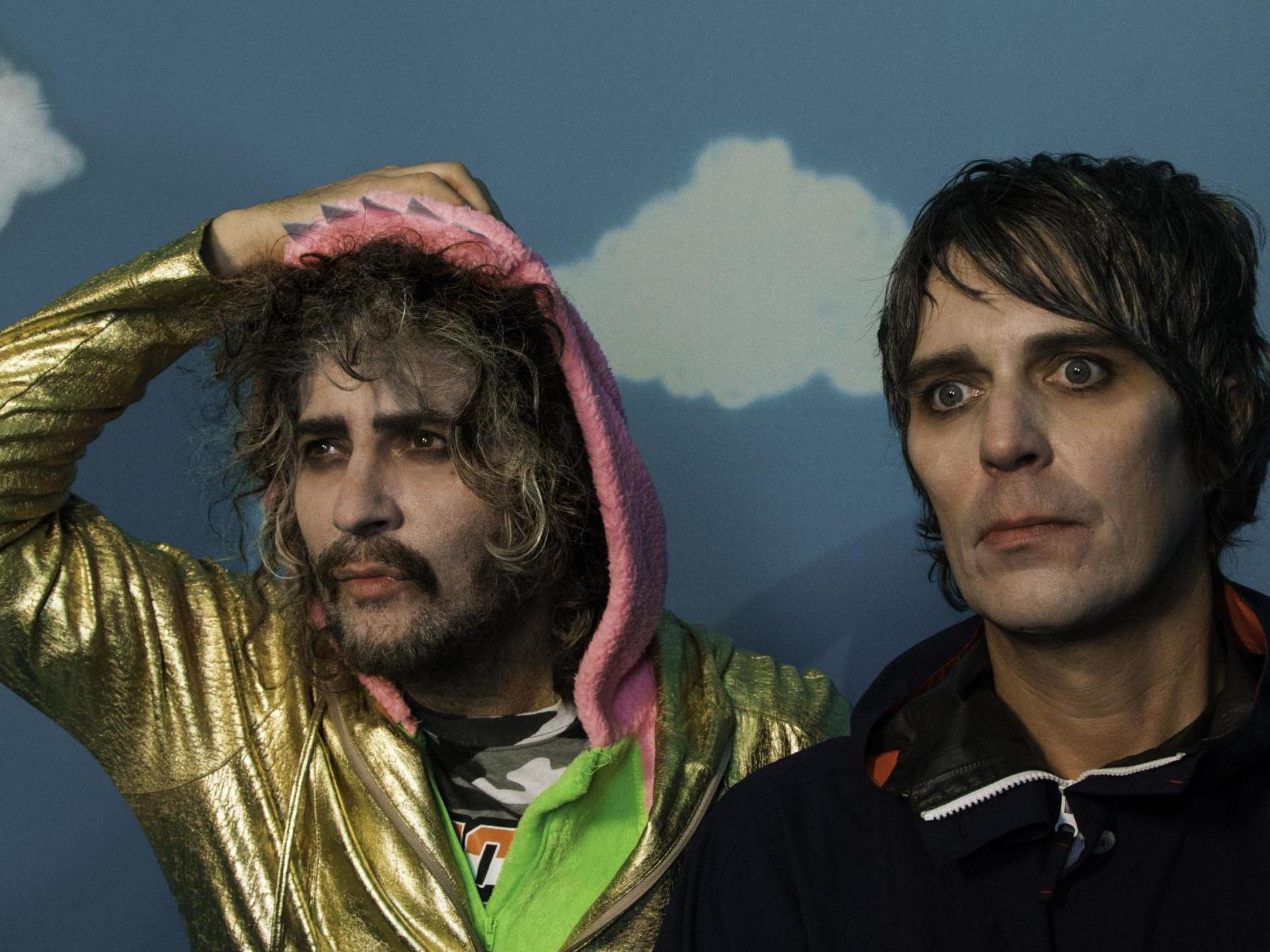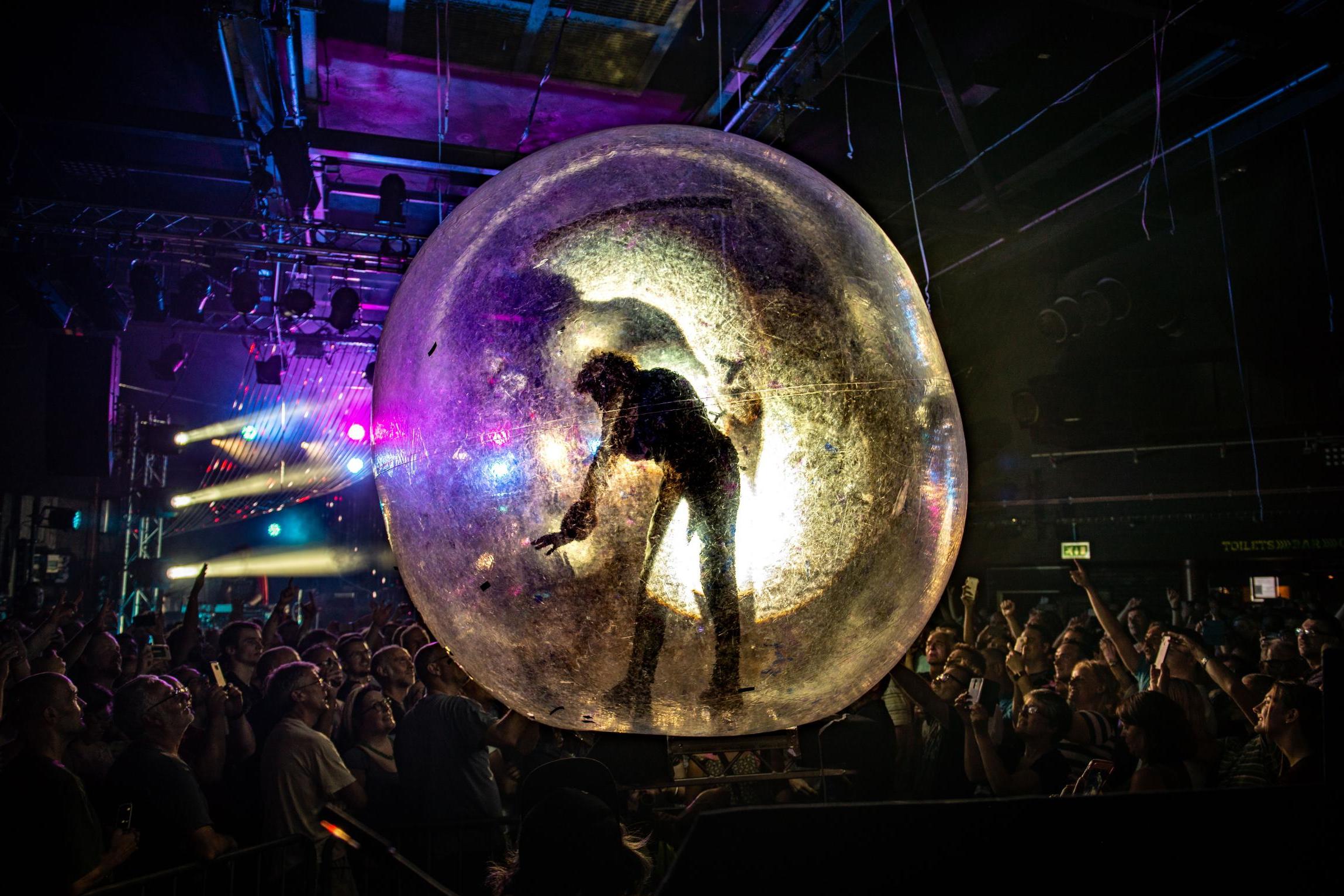The Flaming Lips: ‘We tried to give Prince some of our CDs. He gave them back’
As the Oklahoma band release their 15th album, ‘The King’s Mouth’, frontman Wayne Coyne talks to Helen Brown about growing up in the Bible belt, how fatherhood has changed him, and why he doesn’t want his heroes to be like gods


Your support helps us to tell the story
From reproductive rights to climate change to Big Tech, The Independent is on the ground when the story is developing. Whether it's investigating the financials of Elon Musk's pro-Trump PAC or producing our latest documentary, 'The A Word', which shines a light on the American women fighting for reproductive rights, we know how important it is to parse out the facts from the messaging.
At such a critical moment in US history, we need reporters on the ground. Your donation allows us to keep sending journalists to speak to both sides of the story.
The Independent is trusted by Americans across the entire political spectrum. And unlike many other quality news outlets, we choose not to lock Americans out of our reporting and analysis with paywalls. We believe quality journalism should be available to everyone, paid for by those who can afford it.
Your support makes all the difference.Oklahoma?” laughs Wayne Coyne when I ask him to describe the home state of The Flaming Lips. “Oh, it’s Donald Trump World. Bible belt. Kids get shot in schools. Oklahoma City was the first test market for MTV. Those people thought the place was so bland, so generic, that if it worked here, it would work anywhere.”
A strange cradle, then, for Coyne’s “band of weirdos”, famous for psychedelic shows featuring giant, hovering UFOs, dancing rabbits, lashings of flake blood and – once – Justin Timberlake dressed as a dolphin. But, as the band prepare for the release of their 15th album, King’s Mouth, the 58-year-old speaks enthusiastically of his city.
“This place has done so much for us,” he says. “I mean, beyond naming a street after us. Staying here meant we never had to think of ourselves as part of ‘The Music Business’ as it exists in LA or New York. We’ve been free to evolve for decades without the constant comparisons and competition. Of course, I didn’t know that the rest of the world thought I lived in a Rodgers and Hammerstein song until I started travelling in my mid-twenties. My experience of growing up here was nothing like that.”
Born in 1961, Coyne was the second youngest child of a large, Irish Catholic family. His father ran an office installation company, for which his sons were expected to lug “desks, electrical kiosks and thangs” on and off trucks. “Dad was a big, alpha male worker guy. He was always the boss. My older brothers brought a lot of drugs, motorbikes and music into the house. They played The Beatles and Pink Floyd, lying in the dark, getting stoned. Amazing.”
Coyne soaked it all up, along with the soundtrack to The Wizard of Oz – “a technicolour fairytale on the surface, with all that contradictory human longing for home and escape underneath” – and his mother’s Tom Jones records. “His early stuff was so dramatic, over the top. He sounds so intensely broken-hearted – suicidal. I relate to that. I’m also over the top, always having to ask people I work with: ‘Is that too over the top?’ I’m lucky they can tell me, ‘That over-the-top bit there is great, that over-the-top bit there is not.’ I’d rather feel things all the way.”
The Coyne siblings – including one sister – would engage in such wild backyard games that they branded themselves The Fearless Freaks. Coyne was quieter. He would sit in the corner, drawing. “I remember distinctly the night I discovered how to shade, when I was five or six years old,” he recalls. “It was a summer evening and my dad was welding one of our broken bicycles back together. He sent me out of the shed because the light was so bright. I watched it – like extended lightning hitting the trees. The way these shadows worked was like magic. And everything I drew after that was an attempt to recapture my big Shading Experience. It was the first of many moments in my creative life where I’ve felt: ‘Oh man! I’ve found a secret!’”
This gift for locating the transformative wonder in regular – often painful – existence would remain with him, informing the Lips philosophy to this day. Although Coyne’s lyrics are often fantastical – King’s Mouth is a concept album about a giant king who dies saving his kingdom from an avalanche and has his head preserved by his grateful subjects – he’s more stone cold realist than stoner. He’s not into conspiracy theories. Or religion. Although his mother took him to church, she “always stressed the importance of finding s*** out for yourself”.

The band’s best-loved song – 2002’s “Do You Realize??” – is a euphoric boggle at the facts, not fancies, of life. “Do you realise the sun doesn’t go down/ It’s just an illusion caused by the world spinning round… Do you realise that everyone you know someday will die?”
Death has always been a major preoccupation. The day we talk, Coyne is preparing to show his latest art installation at Oklahoma’s Skeleton Museum. Titled “How Joy and Pain and Suffering Become Infants of Wisdom”, it features golden human skulls, garnished with crowns of petals and sunken into a foamy gloop used to make sex toys.
Enjoy unlimited access to 100 million ad-free songs and podcasts with Amazon Music
Sign up now for a 4 month free trial (3 months for non-Prime members)
Enjoy unlimited access to 100 million ad-free songs and podcasts with Amazon Music
Sign up now for a 4 month free trial (3 months for non-Prime members)
Most interviews trace this existential thread back to the moment when the fast food restaurant where Coyne worked from 1979-1990 was held up by a gunman. Lying on the floor with a pistol to his head, imagining his family hearing about his murder on the news, he thought: “This is how it happens. There’s no music, there’s no significance, it’s just random.” But today, he tells me that it came from somewhere else. “With the company my brothers kept, there were always motorbike accidents and drug overdoses. As a kid you don’t always understand it, but I loved my brothers, I still hang out with them all the time, and I saw how the loss of their friends hurt them.”
Although Coyne felt some guilt at not joining his dad’s business, his family always supported his decision to make art and music. As a teen, he got into the punk scene. Gigs by Sonic Youth, Meat Puppets and Black Flag gave him the idea that music could be accessible to amateurs. In 1983, he formed The Flaming Lips with his brother Mark, using instruments that were cheap – they later learned – because they’d been stolen from a church. There’s a myth that their first gig was at a cross-dressing bar, but he laughs at the idea of one of those existing in Oklahoma City in the 1980s.
They made five albums of eccentrically scuffed punk before being signed by Warner Bros in 1990. Nowadays, Coyne reflects affectionately on their attempts to be mean. Their 1990 cover of “What a Wonderful World” was meant to be a sneer, but their pure “cornball” love of the song shone through. By the time drummer Steven Drozd joined the band in 1993, they had begun to ditch the attempts to be cool and embrace their “dorky” enthusiasm. That year, they celebrated the biggest radio hit of their career – the surreal, steel pan tinkling “She Don’t Use Jelly” – but were forced to rethink their sound when guitarist Ronald Jones quit, partly over issues with Drozd’s drug use.
Jones’ departure allowed the Lips to break free of the “rock band” format and venture into fresh sonic soundscapes. They embraced computers back when they “were for nerds not corporations” and tried whacky experiments including handing audio cassettes to 40 friends to play simultaneously in parking lots. The manipulation of tapes and customisation of instruments to embrace their flaws also lay at the heart of their classic 1999 album, The Soft Bulletin. Widely hailed as their Pet Sounds, the record is the perfect collision of Coyne’s profound trippiness and Drozd’s widescreen melodic charm.
Coyne says the death of his father – quickly, from cancer, in 1997 – pushed him into deeper emotional territory. He also had another creative leap when he “found a quote about how The Beatles were just humans too”. He exhales. “Y’know, that just never occurred to me. Growing up, I felt like they were from another world. Then I thought: ‘This incredible music comes from regular dudes just working hard and being creative.’ I realised that was even better. I don’t want my heroes to be like gods. When David Bowie died, people said he was an alien from another world and I think that undersells what he achieved. He was a man who got sick and died, but he sounded like an alien. I realised I was a normal dude, but if I worked hard I could make something amazing too.”
This allowed Coyne to create a stage persona for himself: a “worldly pirate from outer space who’s bringing this message of love”. But beneath the glitter and eyepatches, his yearning for realness and humanity means Coyne has no truck with celebrities who buy into their own deification. He laughs with me about how Beck treated the band when they supported him: “We weren’t allowed to walk down the same hall as him, and sometimes he wouldn’t give us a dressing room. He thought he was untouchable. But you can’t make music and be untouchable, really, because you’re already giving up a part of yourself.”
He also gets annoyed when bands won’t play their hits. “I love Radiohead, they’re brilliant. But I was at a gig where they didn’t play ‘Creep’. I remember standing on a chair at the end of the night, like the last person in the venue, shouting, ‘You didn’t play Creep!’ I mean, I was being funny. But I still wanted to hear them do it. We always play ‘Do You Realize??’ unless we run out of time, because I know what it means to people.”
The only person Coyne didn’t mind being “all enigmatic” was Prince. “We did a Brit Awards where he was performing. We got the courage to go over and give his bodyguard some of our CDs to give to Prince. We were so thrilled at the possibility of him hearing our music. But at the end of the night, the bodyguard came and found us and handed all the CDs back. He said: ‘Prince doesn’t want these.’ We loved him so much for being too cool for us.”
From 1999 onwards, Coyne began to acquire a host of celebrity fans – people like Yoko Ono, Nick Cave, Bon Iver, Kesha, Chris Martin and Miley Cyrus. Seeing very little distinction between art and friendship, he’s made music with all of them. He talked Cave and Martin into giving blood to be pressed into records, and raised eyebrows when he got a matching tattoo with Cyrus in 2014. Some thought he was having a midlife crisis, perhaps prompted by the break-up of his 25-year relationship with Michelle Martin-Coyne two years earlier. But he feels that he’s just been embracing life. “I mean, Miley is a friend. Another freak. I forget I even have that tattoo of her dead dog. I’ll pull off my shirt and think: ‘What the f***? Oh! Yeah!’”

This June, he and his new wife Katy Weaver announced the birth of their son, Bloom. Coyne is loving fatherhood. “Because I’m not some young, testosterone-fuelled, ambitious young man anymore. I can really enjoy this experience. So much of life is about suppressing your instincts. You want to say: ‘Move away, you stink!’ to somebody, but you don’t because you’re being polite. Then parenthood asks you to just run entirely on instinct. To trust that. Amazing. Plus, I feel that being the leader of the insane circus of The Flaming Lips has totally prepared me for fatherhood.”
Coyne has played baby Bloom some songs from King’s Mouth “and he seems to react”. The record – with bedtime story-style narration by Mick Jones of The Clash – is illuminated by heart-swelling lullabies and cosmic love. “Oh mums and dads in your ships and cars,” he sings on the title track. “Show your children how they came from the stars.” He remembers his own mother, who died in 2004, on “Giant Baby”: “I saw your face up in the sky, in a cloud across the moon and it made me cry.”
“And that,” says Coyne, “is what I find so amazing about music. It’s a time machine. It can bring dead people back to life.”
‘King’s Mouth’ is out on Friday
Join our commenting forum
Join thought-provoking conversations, follow other Independent readers and see their replies
Comments